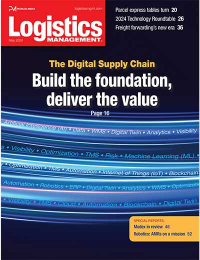FMCSA issues final rule requiring $75,000 bond for brokers for claims

The Federal Motor Carrier Safety Administration (FMCSA) late last month published a final rule titled “Broker and Freight Forwarder Financial Responsibility.”
FMCSA says its decision does five things:
- Establishes procedures and requirements for the immediate suspension of broker and freight forwarder operating authority registration if the available financial security falls below $75,000;
- Helps prevent those brokers and freight forwarders from accruing additional claims over time;
- Clarifies when a broker or freight forwarder is in financial failure or insolvency and establishes related requirements;
- Amends FMCSA regulations to add civil penalties for surety and trust fund violations of the regulations; and
- Establishes a process for the suspension of sureties and trusts in the event of noncompliance with the regulations
“It is FMCSA’s intent that the provisions in this rule will alleviate the effects of broker or trustee non-payment of claims,” the agency said. “Brokers who fail or refuse to pay carriers for legitimate services rendered will have their operating authority suspended and will be unable to continue accruing claims over time.”
Carriers will have more information to help them avoid contracting with unscrupulous brokers. Truckers could also receive payment for work completed in a more timely manner, without use of interpleader proceedings.
The final rule will help ensure this happens by limiting the asset types that can be maintained in broker or freight forwarder trusts to cash, irrevocable letters of credit (ILCs) issued by a federally insured depository institution and U.S. Treasury bonds. Assets in these trusts are used to satisfy legitimate claims against brokers who fail to pay for services rendered while requiring that trust providers be more robustly regulated by other agencies, FMCSA said.
“Our decision comes after thorough assessment of all relevant data and feedback received,” FMCSA said. It amends the regulations pertaining to financial responsibility requirements for brokers of property and freight forwarders in five separate areas: assets “readily available,” immediate suspension of broker/freight forwarder operating authority, surety or trust responsibilities in cases of broker/freight forwarder financial failure or insolvency, enforcement authority and entities eligible to provide trust funds for brokers and freight forwarders.
The changes are effective Jan. 16, 2024. Brokers, surety providers and financial institutions must comply with the provisions regarding immediate suspension, financial failure or insolvency, and enforcement authority on Jan. 16, 2025.
Pursuant to this final rule, when a broker or freight forwarder's available financial security falls below $75,000, FMCSA may suspend its operating authority registration.
A broker's or freight forwarder's “available financial security” may fall below $75,000 because a broker or freight forwarder consents to a drawdown, or if a broker or freight forwarder does not respond to a valid notice of claim from a surety or trust provider, or if a claim against the broker or freight forwarder is converted to a judgment, the agency said.
If the available financial security falls below $75,000 and the broker or freight forwarder does not replenish funds within seven calendar days after notice from FMCSA, the agency will issue a notification of suspension of operating authority to the broker or freight forwarder.
“This rule will result in benefits to motor carriers,” FMCSA stated in the rule. The agency states that often when a carrier submits claims to the financial responsibility provider over $75,000, the provider will submit the claims to a court in an interpleader action, which can be costly and time-consuming for carriers.
“FMCSA believes that most brokers operate with integrity and uphold the contracts made with motor carriers and shippers,” the agency said. “However, a minority of brokers with unscrupulous business practices can create unnecessary financial hardship for unsuspecting motor carriers.”
FMCSA estimated that 1.3% of brokers—or 429—experienced a drawdown on their surety bond or trust fund in 2022. The average claim is about $1,900. However, of the brokers who receive claims, 18% may receive total claims of more than $75,000, potentially leading to interpleader proceedings.
FMCSA estimated the 10-year cost of the rule will total $5.5 million on an undiscounted basis, $3.9 million discounted at 7 percent and $4.7 million discounted at 3 percent.
The Transportation Intermediaries Association (TIA), which represents the third-party logistics industry, praised the rulemaking, calling it “long overdue.”
“3PLs (third-party logistics companies) and brokers are in the midst of a fraud epidemic, and a significant aspect of that fraudulent activity centers around trust fund providers and fraudulent entities in the marketplace,” TIA President and CEO Anne Reinke said in a statement.
“The FMCSA's efforts to increase the barrier of entry into the brokerage industry through the elimination of fraudulent trust fund providers will make it more challenging for criminals and scammers to establish a presence in the marketplace as easily,” she added.

Article Topics
3PL News & Resources
UPS announces CFO Newman to leave company, effective June 1 April Services PMI contracts after 15 months of growth, reports ISM 2023 industrial big-box leasing activity heads down but remains on a steady path, notes CBRE report Q1 U.S. Bank Freight Payment Index sees shipment and spending declines Ryder opens up El Paso-based multi-client facility logistics facility April manufacturing output takes a step back after growing in March TIA rolls out updated version of framework focused on fighting freight fraud More 3PLLatest in Logistics
UPS announces CFO Newman to leave company, effective June 1 Preliminary April North American Class 8 net orders are mixed Senators take a close look at Amazon with Warehouse Worker Protection Act Despite American political environment, global geopolitical risks could be easing Maryland DOT: $1.9 billion and up to four years to rebuild bridge sunk near Baltimore port April Services PMI contracts after 15 months of growth, reports ISM 2023 industrial big-box leasing activity heads down but remains on a steady path, notes CBRE report More LogisticsSubscribe to Logistics Management Magazine

Find out what the world's most innovative companies are doing to improve productivity in their plants and distribution centers.
Start your FREE subscription today.
May 2024 Logistics Management

Latest Resources














